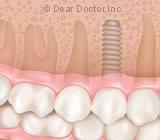 Modern dental implants not only help you maintain your normal chewing ability and speech patterns after you have lost a tooth or teeth — they also keep you looking younger. How do they do this? Read on.
Modern dental implants not only help you maintain your normal chewing ability and speech patterns after you have lost a tooth or teeth — they also keep you looking younger. How do they do this? Read on.
Do lost teeth cause tooth-supporting bone to “melt” away? Yes. Of course, the bone does not actually melt. Bone is a living tissue, and under normal conditions it constantly dissolves and rebuilds. Stimulation by the small stresses from the contact of upper and lower teeth — something that normally happens hundreds of times each day — keeps these two forces in balance. When a tooth is missing, the bone that normally surrounds and supports the tooth (called alveolar bone) no longer receives the stimulation that causes it to rebuild, and it begins to diminish over time.
What happens if you don’t replace missing teeth? The first year after a tooth is lost, the width of the bone that once surrounded the tooth decreases by 25 percent. Over the years, gradually increasing bone loss results in sunken cheeks and lips, making you look older. Gum tissue also decreases, affecting your ability to chew and speak.
What happens if you lose all your teeth? For people who have lost all their teeth, called edentulous, the effects are severe. After the alveolar bone is lost, the bone beneath it, called basal bone, also begins to be resorbed, eventually causing the lower part of the face to partially collapse.
Do partial or full dentures prevent bone loss? Unfortunately, just the contrary is true. A removable denture pressing on a person’s gum increases bone loss because the pressures from biting are not transferred into the internal structure of the bone but instead are compressive, which damages the bone over time. This is why dentures begin to fit poorly after they have been worn for a while. This problem can be reduced by anchoring dentures with strategically placed dental implants.
What is a dental implant? A dental implant is a tooth-root replacement that is made of titanium. This metal is able to osseointegrate, or fuse with the bone. For a single tooth replacement, a crown that looks and functions like natural tooth is attached to the titanium implant. As mentioned above, implants can also be used to anchor dentures.
Does an implant prevent bone loss? Yes. When dental implants fuse to the jaw bone, they stabilize the bone. They also provide tooth-to-tooth stimulation that was formerly supplied by the natural tooth.
How long do dental implants last? Dental implants have been shown to last at least 10 years. For most people, implants will last the rest of their lives.
Contact us today to schedule an appointment to discuss your questions about tooth loss and dental implants. You can also learn more by reading the Dear Doctor magazine article “The Hidden Consequences of Losing Teeth.”



